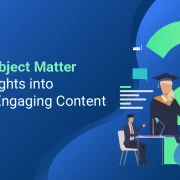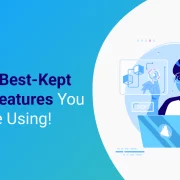
How to Design Learning Solutions That Connect With Millennials?
Summary
Discover key insights into designing learning solutions tailored to millennial learners, focusing on flexibility, technology integration, and the need for engaging and relevant content that resonates with this tech-savvy generation.
Millennials don’t prefer learning solutions and that’s a myth. FYI, the people born in the digital era of the 80s and 90s are considered millennials; they account for 30% of the world’s population.
Millennials are known for their dedication to work and tech savviness, and they highly value knowledge. Most of them feel that one doesn’t necessarily need to be in a classroom to learn new things and highly enjoy learning through online courses. This implies that they don’t learn new things just for the degree but to upskill themselves.
Statistics show that millennials will represent 75% of the global workforce by the year 2025. Just because most millennials are now working professionals doesn’t mean that their eagerness to learn has stopped.
On the contrary, they are still extremely ambitious and in search of opportunities for career progression. Therefore, workforce learning is very popular among millennial employees, and a learning platform that offers the utmost flexibility and bite-sized content is all they are in search of.
To this end, this blog will discuss how to design the perfect learning solution to help working millennials upskill themselves and keep their careers moving forward.
First, Know Your Millennials
Before creating the perfect learning solutions for workforce learning, it’s important to know what will make the learning content appealing to millennial employees.
The ultimate goal of the learning program is to connect with the millennial learner and to make sure that they are having fun in the process. For starters, the learning course creator must know millennials have short attention spans.
Multiple studies have shown that humans now have a shorter attention span than goldfish. Therefore, the content needs to be straightforward and interactive so that learners don’t get bored or distracted. Further, personalized, relevant, and succinct content is something they highly appreciate.
As previously stated, millennials are born in the digital era, so they highly embrace advanced technology at the workplace and for learning. They can easily adjust to new technological trends and prefer flexibility while learning new content.
This is why millennial employees highly prefer digital learning platforms – they get to personalize the topics, learn in their own time, and even learn on the go.
Predominant Design Elements While Designing for the Millennial
eLearning platforms can be the go-to option for working millennials if certain design elements are considered while creating the course topics and platform interface.
Working professionals don’t have the time to sit down for hours to learn a topic. So, the first and foremost thing to consider while designing the interface of an online learning platform is to keep the features simple yet valuable.
Some online learning platforms offer various features to learners that are often not even necessary. Keep in mind that the more options you offer millennials, the more time they are required to spend making decisions.
Millennials don’t have a lot of patience for this, so it’s better to offer them the features they will need. Also, an interface that supports smartphones and tablets apart from the desktop is crucial so learners can learn anywhere they want.
A 30-minute-long video of an online course isn’t something most learners will prefer learning from on a smartphone.
Videos are indeed the new text, but even videos get boring when they are too long. Videos longer than 4-5 minutes usually don’t grab attention nowadays.
Instead, breaking down broad topics into bite-sized content is a more innovative way to keep millennial learners engaged throughout. Including color-coded diagrams, relevant images, infographics, and charts wherever possible is also very effective in clarifying complex concepts for learners.
The gamification feature has taken over learning platforms in recent years. Since it’s proven that learning through interactions is the best way to understand and remember concepts for a longer time, gamification is a must-use feature to make learning sessions fun and effective.
Instead of making the courses highly theoretical, explain them to the learners in the form of a narrative with real-life examples. The inclusion of games will bring out the competitive nature in the millennials, and as a result, they will be motivated to perform better.
Microlearning for Millennials
Millennials are into training methods that are experimental, collaborative, comprehensive, and quick at the same time.
If you want to tick all the boxes and make an ideal eLearning platform for millennial working professionals, ‘microlearning’ is the way to go.
In microlearning, you divide broad, complex concepts into simple, bite-sized videos. This way, learners get in-depth knowledge about the topic and learn whenever they want.
Another great feature of microlearning is personalization which allows learners to customize their lessons based on their requirements. This is revolutionary as traditional classrooms cannot provide this opportunity to the learners.
Project-based learning, collaborative learning, quizzes, and regular assessments give millennial learners room to work on their mistakes.
Microlearning also provides feedback to each learner to let them know which aspects need improvements and where they are doing well. This feature is very appealing to millennial learners are they thrive on feedback.
Moreover, the microlearning feature ensures that the courses are action-oriented for an improved learning experience.
Discover What Will Inspire Them to Perform Better
As previously discussed, millennials are highly competitive, and they appreciate challenges.
Features like gamification, microlearning, etc., allow them to push their boundaries and thrive to do better because they get regular constructive feedback about their performances.
Teamwork and social learning are also something they find useful as it helps them learn from other learners and identify which part needs improvement.
Keep in mind that millennials have a high degree of social awareness and are always eager to make a difference in the world with their work.
The key takeaway from this fact is to make the working millennials feel that they are part of a cause that will lead to positive changes.
Create your content in a way that will show the learners that they can make an impact in the world by learning the course. This is a very effective way to inspire millennial learners to give their best.
How Hurix Can Help
Hurix is an eLearning platform that enables you to design and develop learning programs for workforces across industries. The personalized Learning Solutions offered by Hurix can help organizations by upskilling their millennial employees.
Connect with us to start a conversation around learning solutions to engage your workforce!








